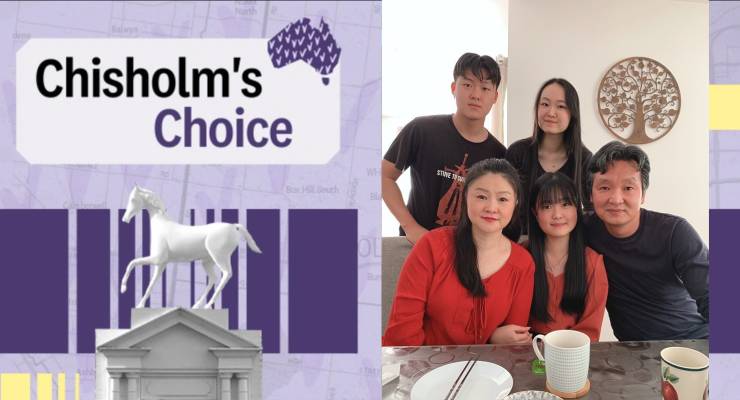
In this election series, Crikey teams up with the University of Melbourne’s Centre for Advancing Journalism to delve into the heart of federal marginal seat Chisholm, in south-east Melbourne, to see what people are thinking about in the lead-up to the poll. Find more of the series here.
In the Yang household in Mulgrave, the alarm sounds at 4am on weekends and Xin Yang is soon on empty roads heading to the Ventura bus depot at Dandenong to begin his shift.
The 52-year-old Chinese immigrant arrived in Australia in 1996 and only recently moved into one of the most hotly contested electorates in the country.
Xin’s wife, Jizhong Pan, is also Australian Chinese. She arrived in Melbourne in 1985 with her parents and met Xin on a trip back to China. They fell in love, and in 1996 decided to settle in Melbourne together.
Last year they sold their Dandenong home, where they raised children Jennifer, 21, Cindy, 18, and Andy, 16, and moved to a quiet neighbourhood near the southern boundary of Chisholm.
Data from the 2016 census indicate that 14.2% of Chisholm’s residents were born in China, and 15.6% speak Mandarin. Xin and his wife are among them. Both speak English and Mandarin at home.
“When we were kids it was exclusively Mandarin, but when we grew up and went to schools, we started to learn English, and now we do mix,” Jennifer says.
Xin has turned his hand to a variety of jobs, including in manufacturing, and ran a fish-and-chip shop before becoming a bus driver two years ago, preferring the weekend and early morning shifts.
“I think being a bus driver has good pay, and it suits what I need for my life. I enjoy driving around to different places and meeting different people … Sometimes I drive past Chadstone and keep going to the Caulfield station,” he says.
Xin always looks after his passengers: “Particularly the vulnerable people like disabled people and older people. I am always willing and happy to give them a hand and make them happy.”
When he first voted in an Australian election, his approach was to choose MPs with a Chinese background. But his thinking and practice on this have changed.
“I felt closer to MPs who can speak fluent Mandarin, but later on I realised that MPs with a Chinese background won’t necessarily look after people who are Australian Chinese,” he says.
Xin recalls the federal election of 2013: Labor’s Mandarin-speaking Kevin Rudd, recently reinstalled as prime minister, campaigned unsuccessfully against the Liberal Party’s Tony Abbott. “As a Chinese, I was really happy to see that the leader could speak fluent Chinese,” he says.
Over the years, he has voted Labor and Liberal.
“I think it very much depends on your class. I voted for the Labor Party when I was working in the manufacturing industry, as it would look after the ordinary workers more, but I changed to Liberal Party after I had my own small business,” he says.
One big issue weighing on him this election is the price of housing. He wants his children to be able to afford a home one day, but is worried the prospect will slip away unless they have careers that bring in big salaries.
Back in 1998, Xin paid $150,000 for his first home, a townhouse in Dandenong. Last year he sold it for $695,000.
“Back in the day, even though I received a low salary, I was still able to afford a house. After all these years have passed, the house prices kept increasing,” he says.







The talk of housing affordability always focuses on the youth and how hard it is for them to enter the housing market. This is not a problem confined to the youth.
I am the sole income earner for a family of 5. This is my second marriage and when my first marriage broke down I gave the ex the house – worst decisions I ever made – I have not been able to enter the housing market since and look unlikely to be able to do so – I therefore face the prospect of retirement whilst renting. There is no assistance for me, I’m too old, just the wrong side of the pay bracket and seemingly on my own, no federal or state assistance for me to enter the market.
Meanwhile exceedingly wealthy people avail themselves of negative gearing to buy their second, third, seventeenth investment property so they can rent it to people like me at exorbitant rates.
Meanwhile politicians and the media point to house prices increases like they are good things….
I think this is a huge issue, no it isn’t an issue for me I have my house, but it makes me really angry that this issue has not been comprehensively addressed. The property market is just crazy. It’s going to eventually become a huge social issue if this issue isn’t solved. So many parents like Mr Xin must be concerned about this…and it should be a political issue. I wonder if the property lobbyists should be kicked out of Canberra, they have to much influence on policy.
He may have had a good capital ‘price’ gain, but in real terms the house ‘value’ has been just treading water, by using a gross 7% benchmark (covers all costs).
In other words, house prices need to double every decade to be treading water in ‘value’ terms; how many ‘homeowners’, whether significant equity or not, have actually lost value?
https://www.afr.com/policy/economy/how-younger-australians-have-been-betrayed-by-both-parties-20220502-p5ahu1?